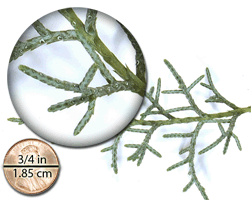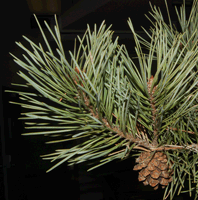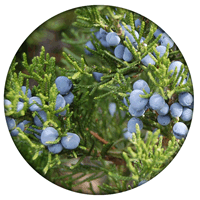Choosing A Tree with Doug's Christmas Tree Explorer™
Use Doug’s Christmas Tree Explorer™ below by clicking on column headers to sort and select trees that match your preferences.
Hover over an ![]() button below to
see more information about a subject. Most tree shoppers feel that choosing a tree is a very personal endeavor
— one that involves selecting the tree with just the right shape, size and smell. However, most of those
same shoppers may not be aware of the full diversity of trees on the market. Indeed, each year Fraser firs and
Douglas-firs comprise an increasing marjority of the market and once-popular other species, such as the Scotch pine,
are found less at retail lots and are increasingly found only at choose-and-harvest farms or even tree nurseries.
Nevertheless, these other trees are out there and very much worthy of continued interest. Below, use Doug’s
Tree Explorer™ — the first of its kind — to explore the diversity of attributes
among America’s top 10 trees. Arm yourself with knowledge and find the tree that’s right for you.
button below to
see more information about a subject. Most tree shoppers feel that choosing a tree is a very personal endeavor
— one that involves selecting the tree with just the right shape, size and smell. However, most of those
same shoppers may not be aware of the full diversity of trees on the market. Indeed, each year Fraser firs and
Douglas-firs comprise an increasing marjority of the market and once-popular other species, such as the Scotch pine,
are found less at retail lots and are increasingly found only at choose-and-harvest farms or even tree nurseries.
Nevertheless, these other trees are out there and very much worthy of continued interest. Below, use Doug’s
Tree Explorer™ — the first of its kind — to explore the diversity of attributes
among America’s top 10 trees. Arm yourself with knowledge and find the tree that’s right for you.
Species |
Leaf-type |
Fragrance |
Color |
Needle Retention |
Softness |
Branch Stiffness |
Avg. Needle Length (inches) |
Availability |
Cultural Notes |
|---|---|---|---|---|---|---|---|---|---|
 Cypress, Arizona Cypress, Arizona |
scale | 5 | 5 | 4 | 3 | 2 | 0.1 | 1 | none |
 Cypress, Leyland Cypress, Leyland |
scale | 2 | 2 | 5 | 4 | 1 | 0.1 | 2 | none |
 Douglas-fir Douglas-fir |
needle | 4 | 2-4 | 4 | 4 | 4 | 1.3 | 5 | state tree (Oregon) |
 Fir, concolor Fir, concolor |
needle | 4 | 5 | 4 | 5 | 4 | 2.5 | 3 | none |
 Fir, Fraser Fir, Fraser |
needle | 4 | 3 | 5 | 5 | 4 | 0.7 | 5 | Presidential favorite |
 Pine, Scotch Pine, Scotch |
needle | 2 | 3 | 4 | 3 | 3 | 2.5 | 2 | Ralphie’s tree |
 Pine, white Pine, white |
needle | 2 | 1 | 4 | 5 | 3 | 3.5 | 4 | state/provincial tree (Maine, Michigan, Ontario) |
 Red-cedar Red-cedar |
scale | 5 | 1 | 4 | 3 | 2 | 0.1 | 1 | the wood of cedar chests and the namesake of Baton Rouge |
 Spruce, Colorado blue Spruce, Colorado blue |
needle | 3 | 4-5 | 2 | 1 | 5 | 0.7 | 3 | state tree (Colorado, Utah) |
 Spruce, Norway Spruce, Norway |
needle | 3 | 1 | 2 | 2 | 3 | 0.5 | 2 | none |
Species |
Leaf-type |
Fragrance |
Color |
Needle Retention |
Softness |
Branch Stiffness |
Avg. Needle Length (inches) |
Availability |
Cultural Notes |